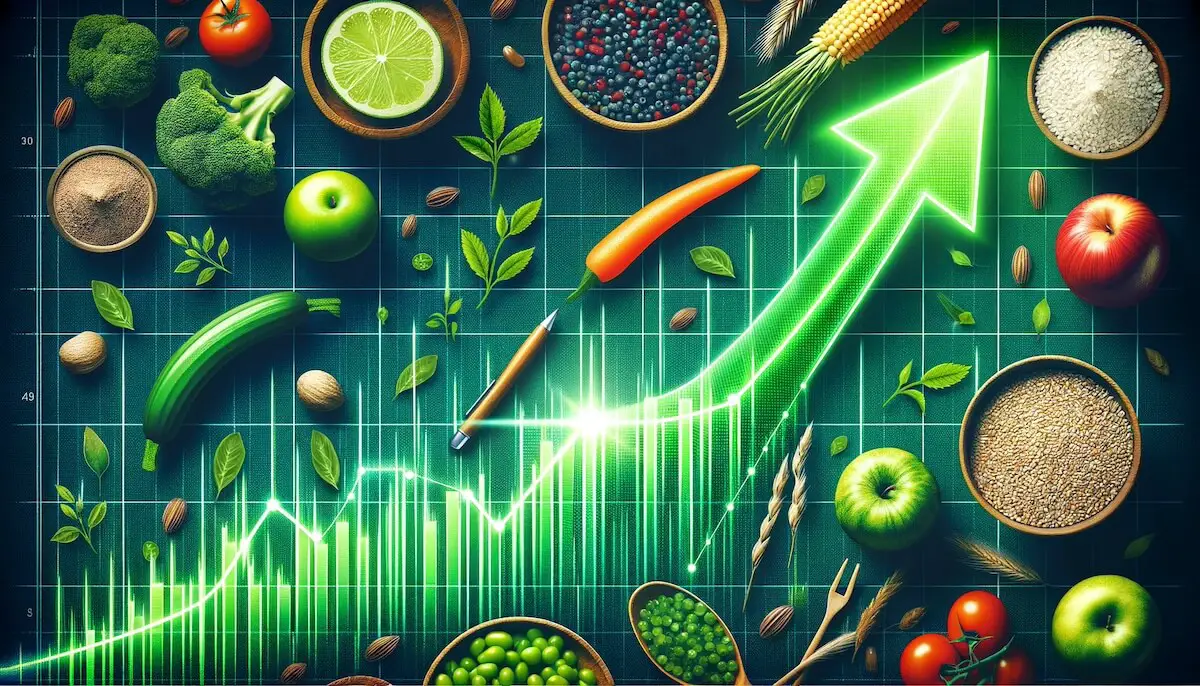Your cart is currently empty!

The landscape of dietary choices is shifting dramatically, as evidenced by the latest vegan statistics that highlight a global trend towards plant-based living.
As of 2019, the meat alternatives market has witnessed a substantial valuation increase, expected to soar from $489.2 million to $726.8 million by 2025.
This growth underscores a wider acceptance and demand for plant-based options, a movement primarily fuelled by younger generations.
Indeed, research indicates a significant portion of Generation Z and Millennials are adopting vegan, vegetarian, and pescatarian diets, driven by a blend of ethical, environmental, and health motivations.
This movement extends beyond just meat substitutes to encompass dairy alternatives as well, with a growing preference for almond, oat, and coconut milk over traditional cow’s milk.
This shift is motivated by concerns over the environmental impact of dairy farming, including its higher greenhouse gas emissions and greater land and water use.
Furthermore, the nutritional profile of plant-based milks, often fortified with essential vitamins and minerals, presents a compelling alternative for health-conscious consumers.
With an increasing number of people choosing to reduce their intake of animal products, veganism is not just a dietary choice but a reflection of a growing societal shift towards more ethical and sustainable living practices.
Market Growth for Vegan Meat
In 2019, the alternative to meat market was valued at $489.2 million and it is currently expected to reach $726.8 million in 2025.
Taking the UK as an example this would reveal a 6.8% increase from 2020 to 2025 and suggests an approximate 30% of the whole European meat alternative market.
The most popular type of vegan meat that dominates in the UK is TVP. In 2019, it was worth almost $217 million equating to almost 44 per cent of the whole market place for meat alternatives. It has been predicted to reach $317.6 million by 2025.
Other popular types of vegan meat are mycoprotein and Quorn as well as soy products, of course, like tofu.
Vegan Statistics in the UK
Research by Finder reveals that more than a quarter of Generation Z follows a meat-free diet of which 9% are vegans, 9% are vegetarian and 8% are pescatarians.
Millennials follow closely with 8% as vegan, 7% living as vegetarians, and just over 6% follow a pescatarian diet.
4% of 20-29 year olds followed a vegan diet in 2022. In fact, people under the age of 50 were more likely to be vegans than those in the older age bracket.
Vegans By County:
- Greater London 6.8%
- The North East 4.9%
- East Midlands 4%
- West Midlands 6.8%
- East England 6.4%
- Yorkshire and the Humber 3.6%
- South East England 4%
- South West England has only 2.8%
5.4% of people in Scotland are vegan, 3.9% in Northern Ireland, and Wales has 3.1%.
A study by Ipsos in 2022 found that 46 per cent of British people between the ages of 16 and 75 are considering reducing the intake of animal products and 58 per cent are already using plant-based meat alternatives within their diet.
Animal Clock UK stated that in 2016, a survey of British adults confirmed 1 per cent identified as vegan but this was a substantial increase of 350 per cent in comparison to the ten years before.
Milk Alternatives and Environmental Impacts
The surge in plant-based milk’s popularity has been challenging for the dairy industry, primarily due to the more sustainable and ethical production processes of alternatives such as almond, soy, oat, and coconut milk.
These options present a stark contrast to cow’s milk in terms of environmental impact, showcasing:
- A reduction to one-third in greenhouse gas emissions
- A decrease to one-tenth in land usage
- A significant reduction, requiring up to twenty times less water
Moreover, while dairy milk is richer in calories and saturated fats, plant-based milks are competitive in nutritional value, especially calcium content—boasting approximately 120 milligrams per 100ml.
To enhance their nutritional profile, these alternatives are frequently fortified with essential vitamins and minerals, including vitamin B12, catering to health-conscious consumers.
Food Security and Sustainability
The intensive nature of animal farming emerges as a significant concern when examining resource use.
Official figures from the UK Government highlighted a slight fluctuation in livestock numbers as of June 2021, with a notable decrease in cattle and calves, and an increase in the pig population, driven by the rise in fattening pigs.
Despite these changes, the overarching issue remains the extensive requirement for animal feed and land dedicated to livestock, in stark contrast to the substantially lower resource needs of a vegan diet.
Adopting plant-based diets could liberate roughly 30% of land currently occupied by livestock or used for producing animal feed.
This transition could dramatically enhance the production of arable crops, providing a robust solution to global warming’s escalating threats, including extreme weather conditions and climate shocks. Prioritizing land use for purposes other than livestock could significantly mitigate environmental degradation.
The Ethical Drive Towards Veganism
Awareness of the ethical dilemmas and environmental toll of animal farming has catalyzed a global shift towards veganism.
This movement is not only about dietary choices but also encompasses a broader commitment to animal welfare and environmental stewardship.
Research from Viva in regards to vegan statistics suggests a burgeoning trend of meat reduction among UK consumers, with a significant portion of the population, including children, advocating for equal moral consideration of farm animals alongside humans and pets.
This shift reflects a growing consensus on the importance of treating all beings with compassion and respect.
Gender and Ideological Perspectives on Veganism
Interestingly, demographics play a role in the adoption of veganism, with women and individuals with left-wing political views more inclined towards plant-based diets.
This tendency highlights the diverse motivations behind veganism, ranging from ethical concerns to health benefits.
Despite some individuals reverting from veganism, the majority remain committed, driven by a deep-seated aversion to the meat industry and a compassionate view of animals.
Health and Environmental Benefits
Vegan diets are rich in antioxidants, fiber, vitamins, and minerals, potentially reducing the risk of certain cancers.
Beyond personal health, embracing veganism has profound environmental benefits, notably in reducing greenhouse gas emissions and the pollution attributed to chicken and dairy farming in the UK.
The shift away from animal-based foods is also crucial in combating antibiotic resistance, further underscoring the multifaceted advantages of veganism.

Global Vegan Statistics and Trends
In the US, veganism is growing, and Plant Protein data confirmed that 6 percent of US consumers are vegan and Ipsos, a global market research company confirmed more than 9.7 million Americans were living a vegan lifestyle.
In the UK, 4.5 per cent of the population currently have a vegetarian or vegan diet and in Canada, according to data released in 2023, 3% of men are listed as being vegan with 5% of women choosing a vegan diet.
The Vegan Society indicates that veganism increased 4x from 2014 to 2019 in the UK and the annual Veganuary event in 2022 led to more than 600,000 people signing up – an increase of 20,000 people on the year before according to Statista data.
Research material on Finder revealed an estimated 2.5 million vegans which equated to 4.7 per cent of adults and an increase of just over one million new vegans between 2023 and 2024.
Per country, India has the largest share of vegans with approximately 13 per cent of its population living a vegan lifestyle. China is next with six percent of the population following a vegan diet and four per cent of people in the United States are vegans.
Vegan Statistics confirm that plant-based lifestyle has been growing in the UK with 60,000 searches to find vegan restaurants increasing from 60,000 in 2017 to more than 200,000 in 2020 and the most interest has come from the UK, Australia, New Zealand, Israel, Germany, Austria, Sweden, Canada, Switzerland and finally, the US. You can view the data here.
Ultimately, the more people who transition to a vegan diet, the fewer animals will have to suffer.

Leave a Reply